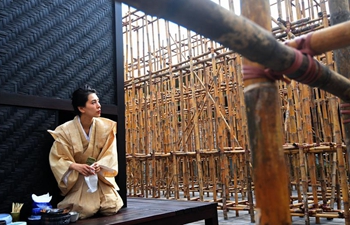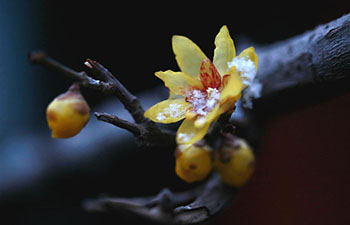NANJING, Jan. 23 (Xinhua) -- Meng Hui began learning to play the trumpet at age 21, not for fun, but to earn money, after he lost his job at a coal mine in Mazhuang Village, east China's Jiangsu Province.
Some 15 years ago, the village brass band offered him a job with a stable salary. He has continued to play the trumpet ever since, and worked his way up to become the leader of the band.
"I was asked to help tune and fix instruments, and the then band director Meng Guodong persuaded me to pick a musical instrument to play," Meng Hui recalled the first time that he picked up a trumpet.
The first tune he learnt was the children's song "Twinkle, Twinkle, Little Star."
The village band was founded in 1988 by Meng Guodong, the village Party chief. He set up the band with the idea to "make Mazhuang famous," as audiences would be impressed by Chinese farmers playing western brass instruments.
The village committee paid residents to join the band. Only a small number of the founding members knew how to play the Chinese flute or suona horn. Most started from ground zero like Meng Hui.
Mazhuang was previously a coal mining village. Meng Hui's father was coal miner and after graduating with a college degree in computer science, Meng Hui worked in the office of a coal mining firm in the village until 2002, when all the small coal mines were closed due to environmental concerns.
By that time, the village was better off and few residents still worked in fields.
The Party chief said, the village did not need money, just something for residents to be proud of.
A year after its establishment, the then 20-member band performed seven songs at a festival gala which was broadcast by the local television station.
In 2006, China Central Television reported on the band. It gained attention and was invited to take part in the International Marching Band Musical Festival in Giulianova, Italy in 2007.
A 28-member band took part in the festival performing Beethoven's "Ode to Joy," Puccini's aria "Nessun Dorma," and Chinese classics "Love My China" and "Picking Lu Chai Flowers."
"That was the first time we went abroad. We had no expectations. There was only one thing on our mind. Don't let our country lose face," said Wang Fei, a member of the band.
To their surprise, they won the second award.
In 2014, the band won the Yui Prize at the Fourth Lyasassa Group Dance Competition in Okinawa, Japan. Most of the band's members are multi-talented, playing multiple instruments or also skilled at singing or dancing.
Meng Hui said many of Mazhuang's 2,000 residents can play brass instruments. At any time, the band would not have any difficulty in finding 200 musicians for a large performance.
"With the band's international exposure and popularity, it can maintain around 30 full-time members and undertakes between 100 to 300 concerts or performances per year, including festival celebrations, wedding or inauguration ceremonies and TV galas," said Meng Hui.
In addition to the village committee's 100,000 yuan (15,600 U.S. dollars) in annual funding, the band earns 300,000 yuan a year in revenue from commercial activities.
Li Hongxia, 40, said working in the band suits her as she does not need to leave home to become a migrant worker. She now earns 3,000 yuan a month and has free time to take care of her family.
"The village is not at the top of any GDP rankings, but we have earned ourselves national honor for being the most civilized and cultural village, and music brings accomplishment and happiness to villagers," said the Party chief.

















